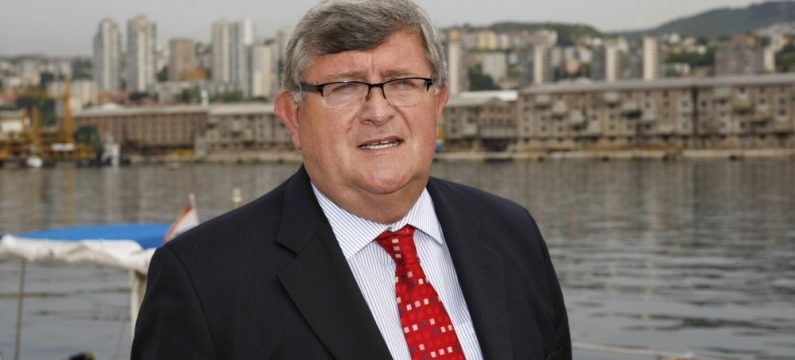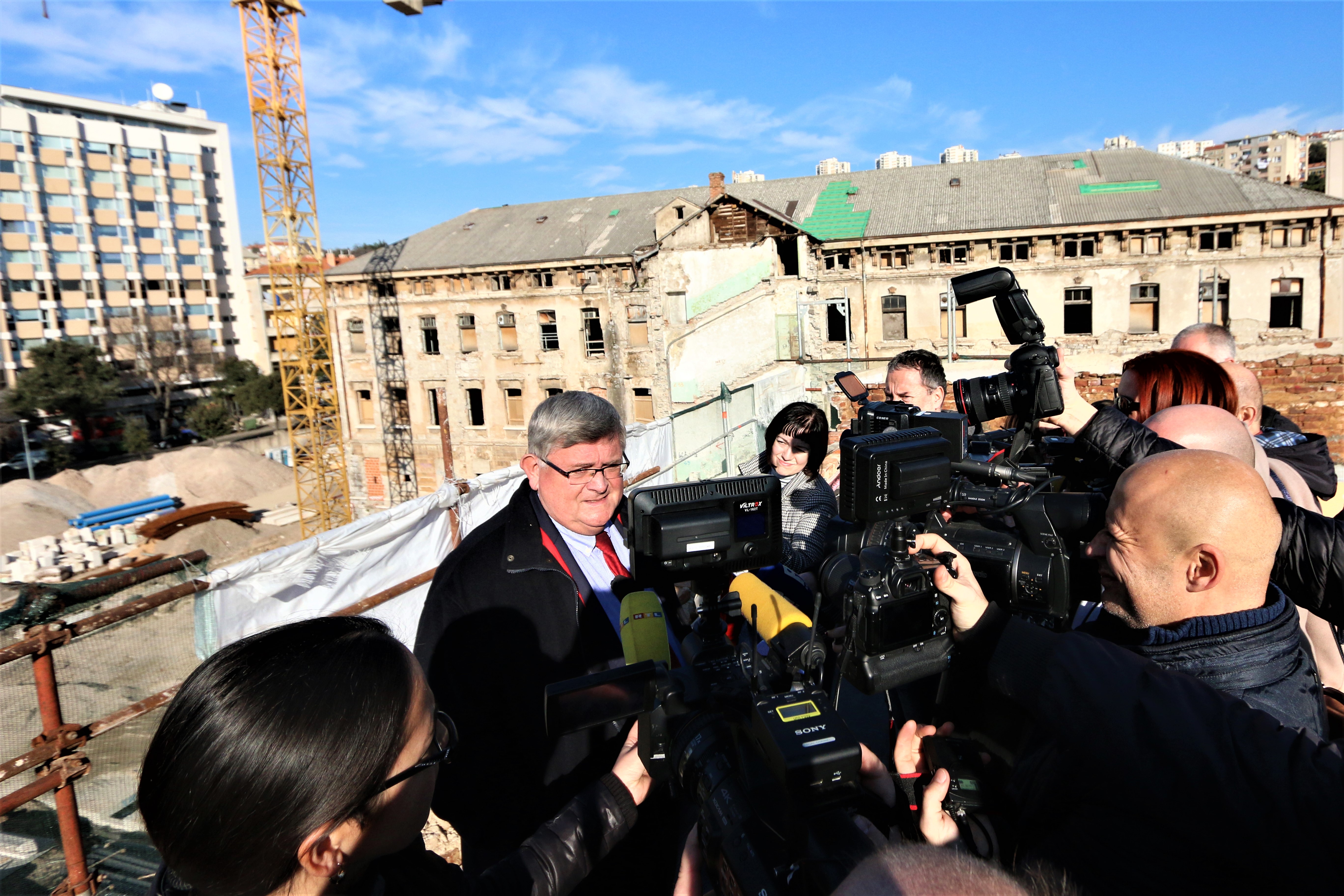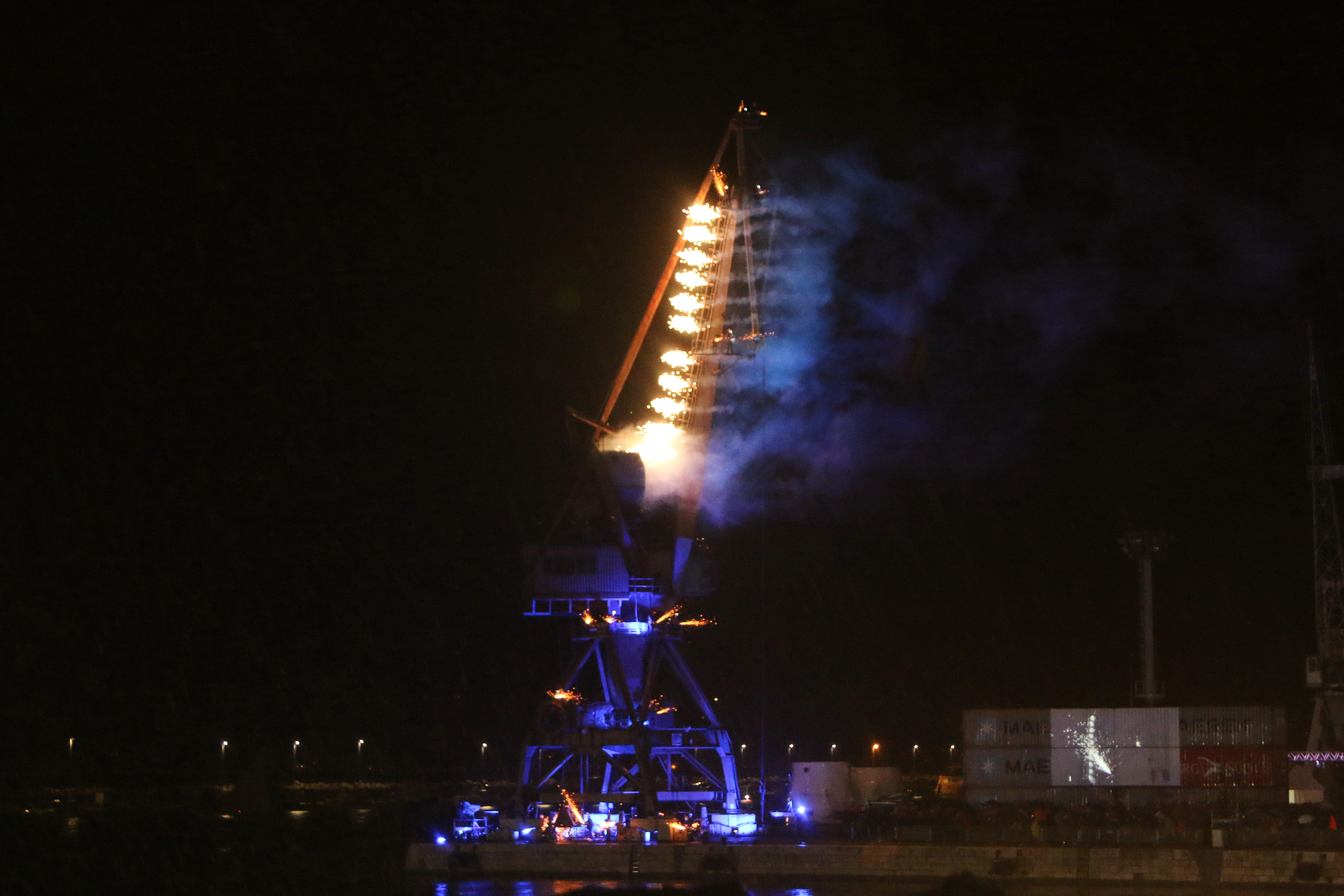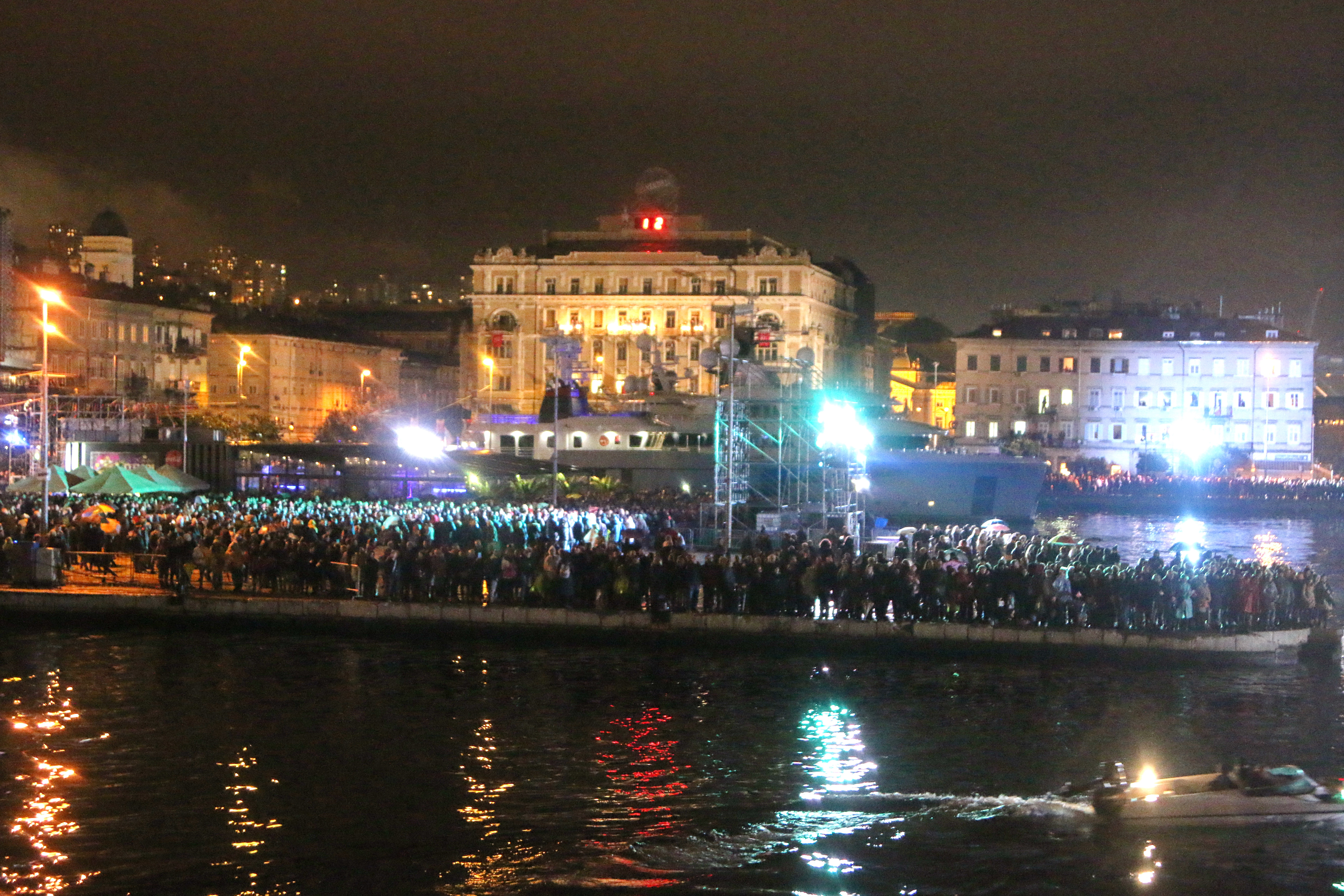The year of European Capital of Europe in Rijeka was opened on February 1st with an all-day program that included 70 events at 30 locations, where tens of thousands of people literally occupied the city.
Rijeka continues the implementation of the European Capital of Culture project, on a reduced scale and through activities that are possible considering the measures to protect against the coronavirus Vojko Obersnel, Mayor of Rijeka, stated for our magazine.

-
You said in your blog that the day when Rijeka was officially declared the 2020 European Capital of Culture turned into a day of tectonic disturbance. What actually happened to the city that day?
Call me biased, but I believe that most citizens of Rijeka will confirm that an incredible positive energy was felt throughout the city. Everything culminated with “Opera Industriale” – loud, powerful audio-visual spectacle that left no one indifferent. Rijeka really did seem like the epicentre of a tectonic disturbance packed with good emotions. It was a great feeling and a confirmation that hard work and effort invested in the organization of the opening of Rijeka as the European Capital of Europe has paid off entirely. The opening was the great celebration of the official start of European Capital of Europe. It is important to say that numerous ECC programs and activities took place even before the grand opening. In fact, some have been going on for two or three years now, and the citizens have accepted them well and joined in on these programs. The focus, however, is on 2020, where nearly 300 cultural programs with more than 600 individual events were to be held. Almost 350 partner organizations and artists from more than 55 countries in Europe and the world were involved in the organization of the program, and part of these programs was definitely strong enough, so to speak, that it could certainly attract tourists, that is, it should have been a reason for an even larger number of tourist arrivals in Rijeka. Namely, in the first two months of 2020, Rijeka achieved an excellent tourist turnover of 37,943 overnight stays, which is an increase of 13% compared to the same period in 2019. Thus, Rijeka positioned itself on the high third place in terms of tourist traffic in family accommodation with 2,650 realized arrivals and took eighth place in the total tourist traffic in Croatia with 20,037 overnight stays. Also, at the beginning of February, the European Best Destinations organization added Rijeka to the list of top 10 European destinations to visit in 2020. I am sure that the reason for this is largely due to the fact that we are the European Capital of Culture.

- Coronavirus changed everybody’s life, how do you see the planned activities and the implementation of plans and projects by the end of the year? To what extent will this affect the revenue, and in this regard, what is happening with the project Rijeka 2020, as the capital of culture?
Unfortunately, less than a month after the opening, we faced a coronavirus pandemic that literally stopped all cultural events overnight. No one could have been prepared in any way for what happened to the whole world. It was impossible at that time to have any estimates of what would happen in terms of the epidemic because the situation was changing from day to day. It was immediately clear, of course, that it will not be possible to implement the Rijeka European Capital of Culture program in the way it was planned for a number of reasons – from the inability of foreign artists to come to Rijeka, the ban on gatherings, ban on organizing events for the public, to the drastic reduction of funds planned for the project in the state, county and city budgets. Revenues – I’m talking only about the city budget – have been significantly reduced due to a series of measures to help entrepreneurs which were adopted due to the epidemic situation, but also due to the overall significant reduction in economic activity in the country. Specifically, as far as the budget of the City of Rijeka is concerned, comparing April 2019 with the same month this year, only because of the measures to help entrepreneurs affected by the corona crisis, budget revenues decreased by as much as HRK 30.2 million, or 36.4%. The true scale of the budget cuts that are yet to be demonstrated in some expenditures that are inevitable as well, such as the increased need of citizens for social programs, is still impossible to determine exactly.
Roughly, due to the coronavirus pandemic, Rijeka ECC was left without two-thirds of the planned funds. In such circumstances, the company Rijeka 2020, which manages the ECC project in Rijeka, was unfortunately forced to rearrange and reduce the program, but also to lay off more employees, with the desire and plan to return at least some of them to their jobs when the program continues after the easing of epidemiological measures. Unfortunately, although the state has a number of measures to help the companies faced with difficulties due to the current crisis, they do not apply to companies founded by cities, municipalities, counties or the state, and Rijeka 2020 could not use them.
We have to point out that the ECC project consists of many cultural stakeholders of this city. First of all, city cultural institutions that immediately moved part of their activities and programs online to stay in touch with the audience, at least online. There are also many artists and organizers who, in conditions where it is hardly possible to be normal, have found a way to keep their audience and offer programs that are feasible. So, although on a much smaller scale than planned, the European Capital of Culture program will still be implemented. What continues regardless of the pandemic is the completion of the Art Quarter. The ECC enabled a faster revitalization of industrial heritage, so the Children’s House and the Museum of the City of Rijeka will soon be opened in the former factory, and next year the City Library of Rijeka, and the ship Galeb will be renovated. For these projects, the funds were obtained from EU funds and they are coming without delay, and the City of Rijeka regularly pays its share in the projects so that the implementation of investments can continue smoothly. These cultural objects will remain a permanent legacy of the ECC project.

- During the Rijeka carnival, you walked around dressed as Jovanka Broz, provoking the public even more after the renovation of Galeb, Tito’s ship used for diplomatic travels which was left neglected after the breakup of Yugoslavia. How is Rijeka dealing with the memories of the Marshall?
First of all, the ship Galeb was declared a cultural heritage by the Ministry of Culture of the Republic of Croatia back in 2006, and the City of Rijeka became its owner in 2009. We estimated that the ship with such history has a great potential to become an extraordinary tourist and cultural attraction. Just let me remind you that the ship was built in Italy as a merchant ship. Then it became a war ship, it was torpedoed, then the Germans took it over, and at the end of World War II it was sunk in the port of Rijeka. Therefore, even if we set aside the fact that it was Tito’s floating residence on whose deck the non-aligned movement was initiated and where the world’s political and cultural elite of the time was a frequent guest, there were reasons to keep the Galeb in Rijeka and to use it as a unique museum at sea, which itself is a museum piece at the same time.
True, the Galeb was the subject of very strong discussions, especially at the Rijeka City Council, but in the end, it will also become a part of the Museum of the City of Rijeka, as planned. After the completion of reconstruction and furnishing, the Galeb will have a permanent museum exhibit, occasional exhibitions, a cinema and creative workshops, all on its 5,565m². Aside from cultural purpose, the Galeb will also have a commercial purpose, so it will also include a hostel, restaurant bar and a souvenir shop.
Opinions about Tito are divided on the entire territory of former Yugoslavia, so Rijeka is no exception. However, nobody can dispute the fact that Partisans, anti-fascists, under the leadership of Josip Broz Tito, freed Rijeka from fascism and finally united the city that was divided by wall between two countries. Tito and the Partisans returned Rijeka to Croatia, within its internationally recognized borders today, the borders that the citizens of Rijeka got to know very well in the Homeland War, defending the sovereignty of their country. I am pointing this out only because someone is constantly trying to impose some anti-Croatian orientation on us, which is simply against the grain.
And the fact that Jovanka and Tito, who appeared at the international processions of the Rijeka Carnival, provoked laughter and joy, proves that the citizens of Rijeka, at least most of us, embrace our past in a very healthy way, that our history doesn’t frighten or burden us.
- Culture, art, the city became rich in various contents, will there be funds to maintain this pace and splendour in the years when Rijeka no longer serves as the capital of Europe?
It is impossible to answer to this question at this moment. Financial situation not only in Rijeka, but in Croatia and the entire world is not at all pink and we cannot know what is in store for us in the future. However, I believe that even the very preparations for Rijeka – European Capital of Culture, have opened up possibilities for future development. First of all, thanks to this title, the neglected industrial heritage is being revitalized. The entire new Art Quarter is being completed in the renovated premises of the former Rikard Benčić factory, where the Museum of Modern and Contemporary Art is already situated. The so-called Palača šećerane (Sugar Factory Palace), one of the most beautiful baroque palaces in Croatia, will soon be occupied by the Rijeka City Museum. The unique Children’s House, where programs and activities for children up to 12 years of age will take place, is also almost finished. The Rijeka City Library will also be located there. Alongside the Galeb ship, there are Exportdrva and RiHub premises that came to life just because of the ECOC. Furthermore, the University of Rijeka is launching new study programs that will strongly influence the future of Rijeka’s culture. One such program is DeltaLab, a centre for urban transition, architecture and urbanism. Before the start of the coronavirus pandemic, numerous educations of the citizens of Rijeka and the region through which numerous people have acquired knowledge, skills and experience in organizing cultural events, have been carried out. Thanks to the development of cultural diplomacy, which is an integral part of the European Capital of Culture project, Rijeka has been creating strategic international partnerships since winning the title. These are just some of the benefits we can take advantage of thanks almost exclusively to the title of European Capital of Culture. In short – the ECC project has brought and will continue to bring new knowledge and ideas to the entire culture of Rijeka, to young people and students, the university community. Unfortunately, because of the pandemic, we will be deprived of part of the planned programs, but on the other hand, this abnormal situation has provoked a large number of creative ideas, new ways of communicating with the audience, new ways of using smart technologies. Just to be clear, this is absolutely no substitute for the ECC program that was meant to be. We can only try to preserve everything that should have remained a legacy after 2020. Personally, I think that the title of European Capital of Culture has opened up completely new opportunities for the development of the whole city and despite everything, despite the entire situation, and especially this economic one that the pandemic has left behind, I still think so.

-
At the opening of Rijeka 2020, there were a number of workers with grinders, and to what extent is Rijeka a city with strong industry today? What are your plans in this area?
The entire Opera Industriale – the central event at the opening of Rijeka European Capital of Culture – was a great homage to industry, i.e. to the workers who built Rijeka. The city suffered the fate of numerous European industrial cities where the industry of the 19th and 20th century slowly disappeared. This transition happened to us during war in Croatia, and that made it even more difficult. This is truly a gruelling process that we experienced, but we also survived it. I see the future of Rijeka in the industry of modern technologies, in the development of small and medium size enterprises. I see it as a city of knowledge. With construction of road and railroad infrastructure, the Port of Rijeka will get a chance for a new momentum. I also believe that Rijeka’s shipbuilding industry will find its place on the global market again, after everything that happened with it, thanks to tradition, knowledge and quality.
6. You have a rich career and experience as Mayor. How much has Rijeka changed during your term, and what’s left that you personally would like to change first?
It has changed quite a lot actually. A lot of sports facilities have been built and they operate at full capacity. Today, for example, it is difficult to imagine a time where there were no Kantrida Pools, Zamet Hall or the Campus of the University of Rijeka that emerged from the vision of Rijeka as a city of knowledge and young people. We have completed several major investment cycles that have restored the municipal infrastructure necessary for the functioning of the city. Today we have a clean sea of excellent quality and full beaches in the centre of Rijeka. We have renovated and restored life in the Old Town of Rijeka, the program of reconstruction of the facades of Rijeka buildings, mainly from the period of historicism and secession, has been on-going for 13 years, and through interventions in building construction we secured the first apartments for young families of Rijeka. We were the first or are among the first in Croatia to withdraw European funds, introduce new technologies, conduct computerization, as well as environmentally sustainable principles. Rijeka is also the most transparent Croatian city. From a city where tourism simply did not exist, today we have a city with one of the highest rates of tourism growth in the country. We invest in the excellence of our young fellow citizens, raise the rank of school standard, we were the first in Croatia to design and introduce Civic education that promotes solidarity, non-violence and tolerance in primary schools, which is an important, if not the most important element of what we call the Rijeka identity. The fact that we are a European Capital of Culture shows an important direction in which we want to move forward, respecting all that is our past.